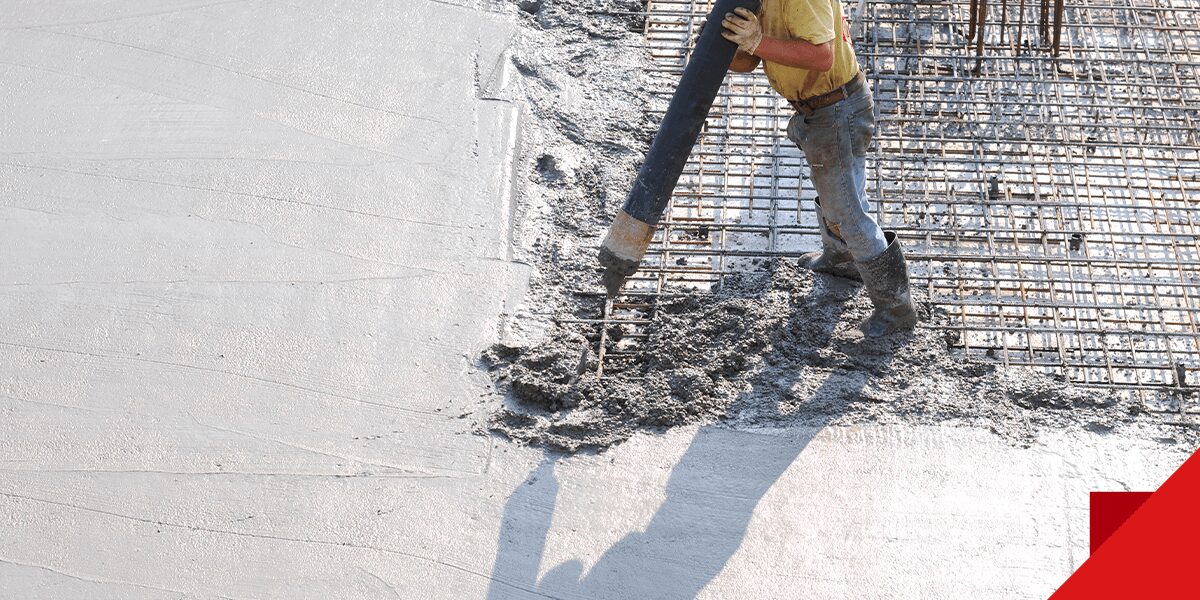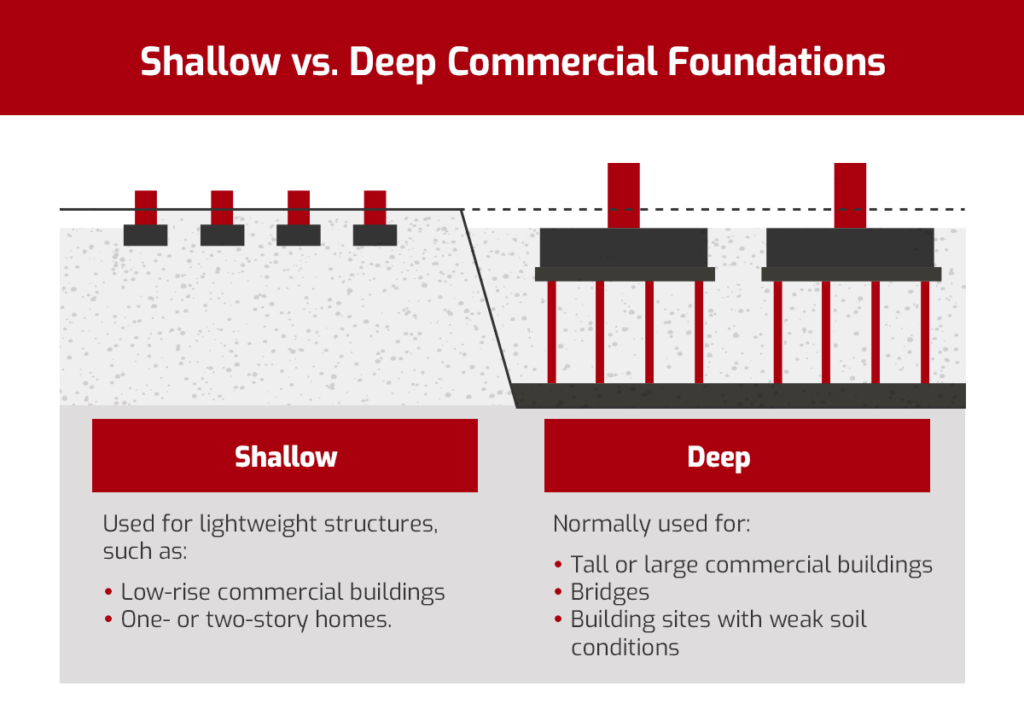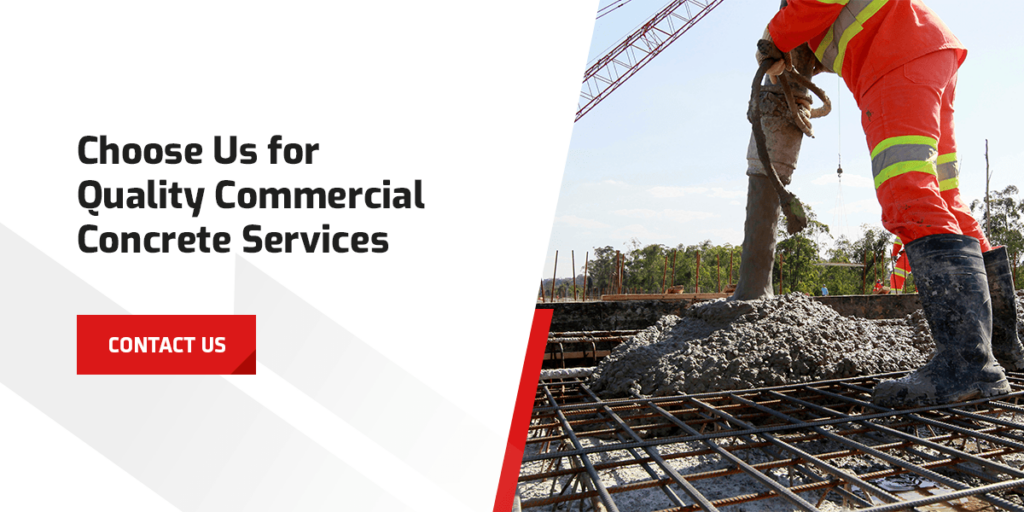COMMERCIAL CONCRETE FOUNDATION TYPES AND CHARACTERISTICS

A decent foundation is paramount to any building — it’s called the foundation for a reason. It’s the backbone that supports the structure’s weight and preserves its integrity, keeping it functional and resilient for a lifetime. A stable, well-constructed foundation prevents the structure from costly and dangerous issues, such as shifting and collapsing.
Concrete is exceptionally strong and durable, making it a go-to material for commercial building foundations. Whether you’re building a new foundation or renovating an existing one, you’ll want to do your homework on the various types of foundations available.
Every concrete commercial foundation has unique benefits and applications, so it’s important to understand the best use cases for each one. That’s where we come in. In this handy guide, we dive into the different concrete foundations and their advantages in commercial construction.
Different Types of Commercial Concrete Foundations
Here are some common types of concrete foundations for commercial buildings:
1. Concrete Slab
Concrete slab foundations are the most standard type, accommodating commercial and residential structures. They contain a slab of concrete, usually 4 to 6 inches thick. However, the total load your foundation will bear will influence the slab’s thickness.
These slabs may be placed on a layer of sand or gravel for cushioning and drainage purposes. Some slab foundations also have insulating foam or supporting concrete feet.
Concrete slab foundations are relatively cost-effective, low-maintenance, energy-efficient and simple to construct, making them a popular choice. Their one-piece configuration offers resistance against mold, pests and other foundational weaknesses.
There are multiple types of slab foundations, including:
- Slab-on-grade: These foundations contain a single layer of concrete poured onto soil. Slab-on-grade foundations are best suited to locations where the ground doesn’t freeze.
- T-shaped: T-shaped slab foundations rest on t-shaped feet, which are installed in the ground below the frost line. Foundation walls are set on top, as well as a slab between the walls. T-shaped slab foundations require three concrete pours, making them a more expensive and time-consuming option. However, they offer more support and structural integrity for load-bearing walls.
- Frost-protected: This type uses rigid polystyrene sheets to insulate and protect the foundation from frost. It’s ideal for colder climates and only requires one concrete pour.
2. Raft
Raft or mat foundations contain one large, continuous concrete slab under a structure. This slab can be circular or rectangular. It evenly distributes the building’s weight across the site using columns on the upper floors.
Raft foundations can support numerous walls and columns at once. They’re suitable for locations with variable or weak soil conditions. They provide stability and prevent differential settlement — the expansion and contraction of underlying soil — by spreading the load over a wide area. Mat foundations are typical solutions for basements and commercial buildings.
3. Pile
Pile foundations contain long, narrow concrete cylinders or piles. When these piles are inserted into the ground deep below the surface level, they transfer the load to the desired depth to support the building. Pile foundations are ideal in the following cases:
- Weak surface soil
- Deep drainage systems
- Soil that cannot be excavated to the desired depth
- High groundwater levels
- Rock strata not far enough underground to warrant a drilled shaft foundation
- Buildings with heavy concentrated loads like bridges, water tanks and high-rise buildings
- Structures near river beds or seashores
4. Drilled Shaft
Also called caisson foundations, drilled shaft foundations support buildings with high structural capacities. They contain hollow cylinders or boxes that act as watertight retainers.
Builders create drilled shafts by drilling holes into the ground, inserting cylindrical shafts or boxes and filling them with concrete. Caisson foundations can be built at the surface and sunk to the desired depth.
These foundations are often used for hillside structures or freeway overpasses. They provide underwater support for bridge piers and concrete dams.
5. Spread Footing
Spread footings or isolated footings have wider bases than standard load-bearing wall foundations. This design distributes the building’s weight over a larger area, offering better stability.
Concrete footings transfer the structure’s weight directly to the soil. They help keep moisture from seeping into the building, thus preventing mold and mildew. Spread footings come in multiple sizes and shapes, including rectangular, round and square.
Spread footing foundations are typically used for walls, individual building columns and bridge piers where the bearing soil layer is within 10 feet of the ground surface. The soil-bearing capacity should be high enough to support the structure’s weight.
6. Spot Footing
While spread footings support the structure’s weight across the entire site, spot footings have a single point of contact with the foundation. Commercial builders often use spot footing foundations to support single contact points — such as beams, posts and piers — between the foundation and underlying soil.
Made of rebar and reinforced concrete, these footings take the loads from a column and spread them to a larger area, allowing the soil to withstand higher weight capacities. They also help the building retain stability through several contact points with the ground.

Deep vs. Shallow Commercial Foundations
Bear in mind that there are two main classifications of structural foundations:
1. Shallow
Shallow foundations are constructed close to the earth’s surface at shallow depths. While deep foundations transfer loads to subsurface layers, shallow foundations transfer the structure’s weight directly to the earth at a surface level. A foundation is considered shallow when its width exceeds its embedment depth.
Builders generally use shallow foundations for lightweight structures, such as low-rise commercial buildings and one- or two-story homes. These foundations are quicker and less costly to install than deep foundations. Some common types of shallow foundations are raft, slab, spread footing and crawl space foundations.
2. Deep
Unlike their shallow counterparts, deep foundations are built at higher depths and transfer loads to deep rock strata underground. Builders use deep foundations when the surface soil’s load capacity is too low to support the structure. These foundations are cast, driven or bored into place for maximum stability. They are deeper than they are wide — their depth-to-width ratios usually exceed 4 to 5.
Some common types include pile, drilled shaft and basement foundations. Deep foundations are normally used for:
- Tall or large commercial buildings
- Bridges
- Building sites with weak soil conditions
Choose Us for Quality Commercial Concrete Services
After exploring the different types of foundations, you can take on your upcoming construction project with more peace of mind. If you need professional assistance selecting and installing a concrete foundation for your building, turn to R. J. Potteiger Construction Services, Inc.
Our fully licensed team has over 30 years of concrete industry experience. We’ve completed a range of residential and commercial projects throughout Pennsylvania, including foundations, steps, floors, walkways and more. We also work on both new and existing concrete structures.
Whatever the type and scope of your commercial concrete project, we are ready to work with you. To learn more about our commercial concrete foundation services, browse our service page or contact us today!




